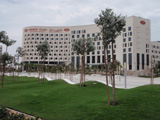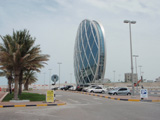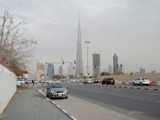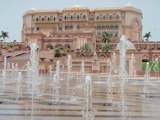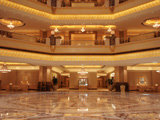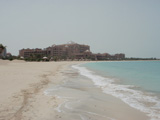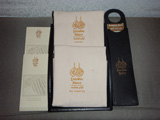 |
It is the capital city of the United Emirates, in the Persian Gulf, and it is the biggest of the seven capitals that form the United Arab Emirates (UAE) federation.
The UAE are governed by a Supreme Counsel of seven emirs, each one governing his own territory. Founded in 1790, the town increased demografically and economically only during the last fifty years, mostly thanks to the discovery of a large number of oil wells, that permitted Abu Dhabi to turn from a small fisherman village into a modern and very rich centre.
The population is formed mainly by Arabs devoted to the agriculture in the oasis and to the fishing along the coasts, whereas the country's economy is mainly based on the oil extraction and refining.
Crossed by the Tropic of Cancer, the climate of Abu Dhabi is mostly dry with temperatures between 26 ° C during the day and 15° C during the night; rainfalls are very rare.
This is one of the most famous tourist destinations in the UAE thanks to its incredible offer of attractions, activities and events. Even the new visitors of Abu Dhabi will be quickly fascinated by how much Abu Dhabi can be seductive and entertaining. Abu Dhabi mixes the glamour of the old world with a modern and sparkling night life.
The capital of the United Arab Emirates Abu Dhabi is not only the biggest town, but also the largest emirate. Located in the Persian Gulf half way in the north coast of the UAE, Abu Dhabi is an important political, commercial and tourist centre. Even if the wealth of Abu Dhabi comes from the selling of oil, a growing percentage comes today from the tourist sector. As a matter of fact, Abu Dhabi with the near Dubai, is constantly improving its international reputation as an interesting destination for holiday and business.
Located on an island, and consequently separated from the dryland, Abu Dhabi is very spacious, rich of green, linear and modern buildings and historical sites.
To be a desert land, Abu Dhabi has a fascinating number of attractions. You can choose between historical sites like Qasr Al-Husn or an oasis town like Al Ain and Liwa, or between modern centers for entertainment as a Culture Foundation and the Heritage Village, or to practice adventurous sports like the wadi-bashing and underwater divings. Many of the Abu Dhabi attractions are located near the Corniche and in the district of Breakwater, which is a popular destination either for the natives and for the tourists.
The nature lovers can make safaris with off-road vehicules or cruises to the islands in order to observe some dying species like the Arabian Orix and many other bird species.
Abu Dhabi is a pleasure for shopping with dozens of commercial centres that mix with the traditional markets. A good choice of the latest items, from fashion to electronics, carpets, antiquities and materials. In Abu Dhabi you can taste either the local cuisine and international one, with hotels that offer an unrivalled service, whereas the souks offer an incredible choice of products at very good prices. You can find in town all the major hotels chains that are conviniently located in down town. Every hotel is a virtual oasis for the traveller, which often offers services and activities that cannot be found in no other place, including restaurants where you can find alcohol and enjoy entertainment till late in the evening. Trying to offer only the best even to businessmen, many hotels can provide the latest technological innovations with large internet band connection in every room and business conference centres.
Proud of an intriguing mix of nomadic traditions Beduins and islamic culture, the people of Abu Dhabi expect respect of their origins with the costumes from their visitors, particularly in public. The Arabians of Abu Dhabi, nevertheless, do their utmost in order to put their guests at one's ease, and this is the reason why it is allowed from hotels to offer any kind of western comfort.
Women in Abu Dhabi are free from some restrictions imposed in the more conservative Arab Countries. Women that visit the country can dress like they would do in their own country, even if it is always requested a certain dignity. The islamic culture does not allow to dress in a bikini or to be scantily clad, a certain care has to be taken in order not to offend the locals when you do open air activities. Friday is considered as the sacred day of the week, therefore Thursday and Friday are considered as the weekend.
Even if there is proof of ancient inhabited centres on the island where Abu Dhabi is located, the permanent settlements started only after 1760 when a source of drinkable water was discovered by the nomadic people. A fisherman village was founded, but only when the region started to become strategically important either for the English Navy and for the local Beduin Tribes, the importance of Abu Dhabi truly started to grow. Nevertheless, only recently Abu Dhabi strongly entered the world map. Vast oil stocks were discovered in 1958, and since then Adu Dhabi conquered a respectful place in the world scene, in particular after the English abandoned their colonial presence in the region in 1971. Just after the UAE was founded with the capital Abu Dhabi. Recently Abu Dhabi has invested a huge amount of capitals to diversify the economy, concentrating on tourism and on the sector of international affairs to reduce its dependence from oil.
With a predominant dry climate, Abu Dhabi has almost always blue sky. The temperature and the humidity sensitively varies all year round. Summer and Autumn (from June till October) are the warmest months with temperatures that surpass 40°C and with 100% humidity, day and night.
Winter and Spring (from November till April) are less humid, quite dry with day temperatures between 18-24°C that lower to an average temperature of 10°C during the night.
During summer the town remains completely empty when the majority of the residents move to fresher climates. The positive side of the summer is that the hotel prices are half reduced and all the buildings have aircon.
Suggested restaurants: Riviera, lebanese restaurant (near hotel Meridien) where you can eat very good, the service is excellent and the price is really good. A meal for two costs between 85/100 AED.
A second restaurant
(sea food restaurant) is Al Sheraa Dhahabi, in Khalifa Street, Abu Dhabi, where prices are convenient and the food is excellent. A meal for two costs between 100/120 AED.
The choice of the hotels is extremely vast. Many hotels have five stars, and in Abu Dhabi and Dubai you can find two of the most extraordinary hotels in the world. Burj al Arab in Dubai, the only 7-star-hotel, where you cannot find a room but only suites with a minimum surface of 170 sqm.; and Emirates Palace in Abu Dhabi of Kempinski hotel chain. A destination that astonishes all those who go beyond the magnificent gates. The luxury fills up every corner of this extraordinary quiet paradise. The Palace boasts 302 grand rooms and 92 wonderful suites, each one of which combines the utmost of luxury with the very last technologies. Arriving with a car, the valets take care of parking; at the reception a guest relation staff awaits you and takes you directly to the room where you meet your butler that gives you all the explanation concerning the room and the services. Everywhere you will find precious marbles and gold. The hotel is surrounded by 100 hectars of park. It boasts a 1.300 m. long beach, a parking place for 2.500 cars and its own heliport. Three billion dollars were spent in its construction and this makes it the most expensive hotel in the world. To stay in this hotel, prices start from 400 USD per night in a Coral room in low season; The Palace Grand Suite is the most expensive: from 11.500 USD per night. In December 2010, the hotel hosted the most expensive Christmas tree in the world valued at 11 million dollars. Thanks to all these features, the Emirates Palace entered the Guinness Book of Records.
  |
(3 billion USD)
1.300 mt. long
Currency in the UAE: Emirati Dirham (AED)
Change of 13. April 2011:
1 € = 5,20 AED - 1 USD = 3,67 AED
Time difference with Italy: + 2 hours (legal time)
